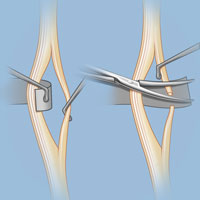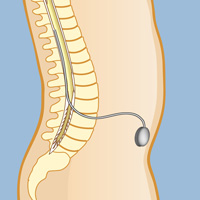
In a selective dorsal rhizotomy, a neurosurgeon cuts the damaged nerves carrying sensory information from spastic limbs where they enter from the spinal cord. Healthy nerves are left intact.
Treatment for spasticity begins with non-invasive, nonsurgical approaches that may improve function and quality of life. When the spasticity is severe and chronic, however, surgery may be recommended as part of the treatment plan.
Orthopedic surgeries may involve altering tendon, muscle, and bone to restore movement and flexibility, used to maintain function as a child grows.
Neurological surgeries include a procedure called selective dorsal rhizotomy, in which the damaged nerves carrying sensory information from the spastic limbs are cut where they enter from the spinal cord. Healthy nerves are left intact. This procedure is often used in children with mild cerebral palsy and has been shown to improve leg function and the ability to walk independently.

An implanted pump can provide ongoing delivery of baclofen, a medicine that relieves spasticity, directly to the spinal cord.
Another effective surgery is the implantation of a pump and a catheter to deliver liquid medication to the fluid around the spinal cord. This treatment option, called intrathecal baclofen therapy, uses a pump under the skin to deliver a steady, constant flow of baclofen, which is a medicine that can help relieve spasticity. Surgery to implant the pump and catheter requires only a short hospital stay followed up by doctor visits to monitor the dosage.
Request an Appointment | Refer a Patient
Reviewed by: Jeffrey Greenfield, Ph.D., M.D.
Last reviewed/last updated: June 2024
Illustrations by Thom Graves, CMI